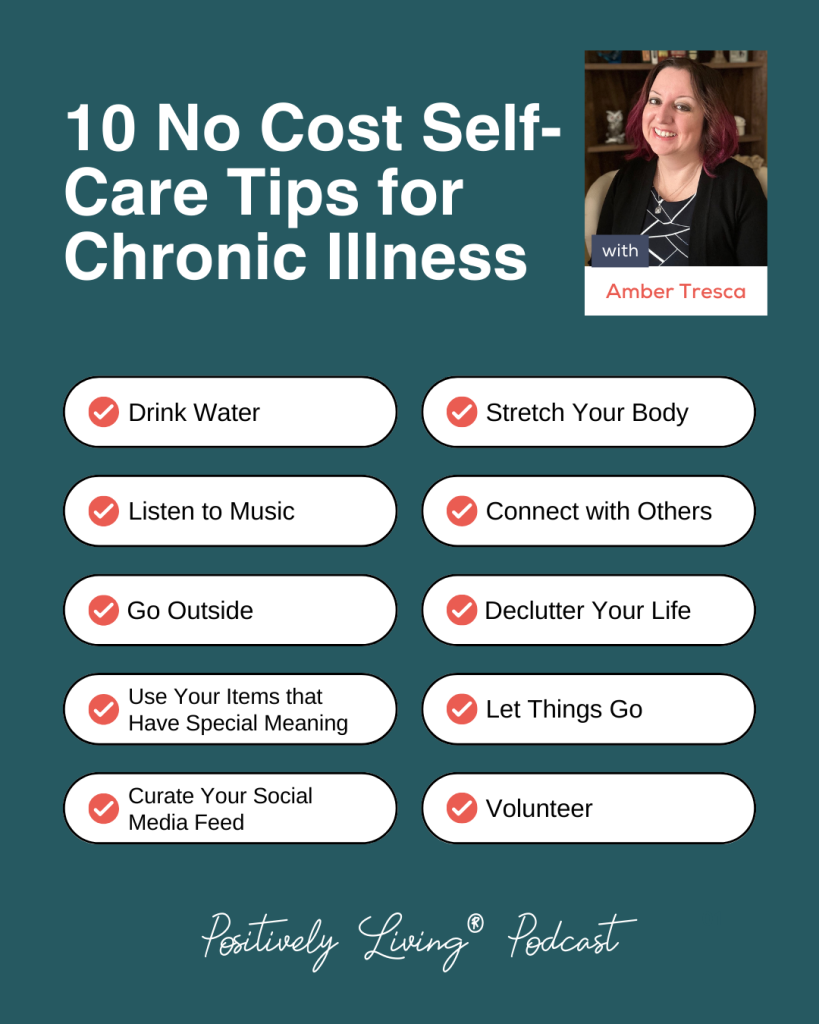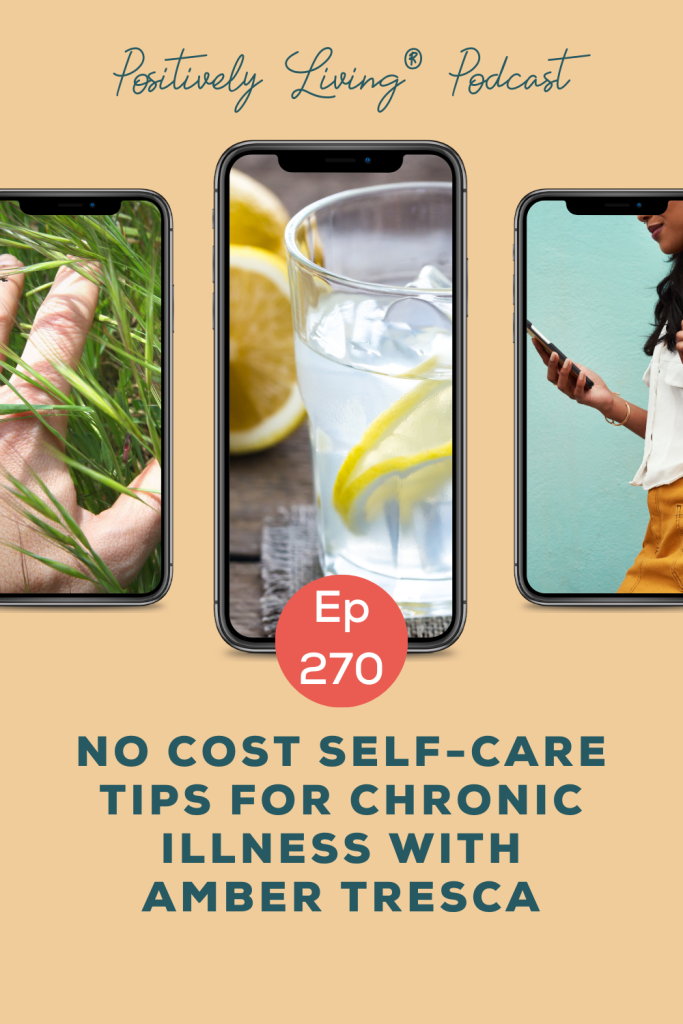Living with a chronic illness can make traditional self-care advice feel impossible or out of reach. Many struggle to prioritize their well-being when dealing with unpredictable symptoms, fatigue, and the constant demands of managing a condition. It can be hard to know what “self-care” even means when your primary focus is often just getting through the day.
This week, in episode 270 of the Positively Living Ⓡ Podcast, I sit down with Amber Tresca, an advocate and activist in the chronic illness community, to discuss practical, low-cost (or even no-cost!) self-care strategies. Amber, who lives with Inflammatory Bowel Disease (IBD), shares her insights on adapting self-care to fit your energy levels and lifestyle, helping you prioritize recovery, build resilience, and move toward a future where thriving is truly an option.
Amber Tresca is an inflammatory bowel disease (IBD) patient who was diagnosed with ulcerative colitis in 1989 at the age of 16 and underwent 2-step j-pouch surgery in 1999. Today, she is a speaker, facilitator, and advocate for people with IBD and works as a medical writer and editor, focusing on patient-facing content in the digestive and rare disease spaces.
Amber and I cover the following topics:
- Why self-care, especially with chronic illness, is primarily about managing your condition and supporting your future self.
- How accessible self-care doesn’t have to cost money; many powerful practices are free or low-cost.
- Simple actions like hydrating, listening to music, or stepping outside can significantly impact your well-being.
- The benefits of decluttering your physical and digital spaces, and “letting things go,” to reduce mental load and stress.
- Why connecting with a trusted support system and even seeking professional financial advice are important, often overlooked, forms of self-care.
Remember that even on days you feel completely disengaged, these tools will be waiting for you when you feel better. You won’t always feel this way. Which of these self-care strategies will you try first to support your well-being?
Practical Self-Care: Smart Strategies When You Live with Chronic Illness
Living with a chronic illness means your body and energy have their own rules. You might feel like traditional self-care advice—think spa days and endless free time—just does not fit your reality. The truth is, managing a chronic condition often is your self-care, and finding ways to truly support yourself without adding more stress can feel like a constant uphill battle. You might struggle with guilt when you need to rest, or feel overwhelmed by all the shoulds from well-meaning people. But what if you could discover simple, low-cost (even free!) ways to care for yourself that truly make a difference, helping you feel better, even on your toughest days?
This article is for you if you live with a chronic illness, support someone who does, or simply want to understand how to prioritize well-being when life is unpredictable. We will look at smart, practical self-care ideas that fit into your real life, helping you build resilience and make room for joy. These insights come from my conversation with Amber Tresca, an advocate for the chronic illness community, who truly understands the daily challenges and shares simple, powerful strategies.
Are You Ready for a New Kind of Self-Care?
If you are thinking, “My life is too busy, too unpredictable, or too painful for self-care,” then you are exactly who this article is for. This is not about adding more to your plate. It is about making small, intentional choices that give you back energy, reduce stress, and support your health in a way that feels possible. Even on days when you feel utterly drained, remember that these ideas will be here waiting for you when your energy returns. This approach to self-care is adaptable and honors your unique needs.
What you will need:
- A pen and paper or a digital note-taking app to jot down ideas.
- A willingness to be kind to yourself as you try new things.
- Access to music (most free streaming platforms will work).
- A comfy spot to stretch or simply rest for a few minutes.
Your Guide to Accessible Self-Care: 11 Practical Tips

1. Rethink Self-Care: It’s Not Always About Pampering
When you hear self-care, your mind might jump to expensive spa treatments or long vacations. But for many, especially those managing a chronic illness, this picture is not just unrealistic; it misses the point entirely. The common mistake is to think self-care must be elaborate or cost money, leading to guilt when you cannot do those things. The truth is, self-care is deeply personal, and often it is about making choices that directly help you manage your condition and prepare for your future self. Think of your future self as your best friend—what can you do today to make their journey easier, even five minutes from now, or a week from now?
The real goal of self-care is to support your health, calm your nervous system, and meet your real needs, even if that means visiting the doctor or doing physical therapy exercises you do not enjoy. These vital actions are self-care because they prevent bigger problems later. When you shift your mindset from pampering to purposeful support, self-care becomes accessible and truly impactful.
Recap for Tip 1:
Self-care is not always glamorous; it is about taking intentional actions that support your current and future well-being, especially when managing a chronic illness.
- Self-care means managing your condition.
- It does not have to cost money.
- Think about your future self as someone you want to care for.
- Not every self-care action will feel fun.
- Purposeful actions like doctor visits or physical therapy are self-care.
2. Drink a Glass of Water
Some of the most powerful self-care tools are simple, free, and often overlooked. When you are not feeling your best, it is easy to forget the basics. People often think they need a grand gesture to feel better, but tiny actions can make a huge difference in how your body and mind respond. Neglecting these fundamental needs can make symptoms worse and increase stress.
Start with the absolute simplest things. Drink a glass of water. It sounds almost too easy, but dehydration can cause headaches and make you feel unwell. This quick practice is a powerful way to support your body immediately.
Recap for Tip 2:
Start with easy, free actions that support your body, making a big impact with little effort.
- Drink a glass of water to support your body.
3. Listen to a Favorite Song
Music has an incredible power to shift your mood and energy. When you are not feeling your best, it is easy to let negative thoughts or feelings take over. You might think you need a long break or a complicated activity to feel better, but sometimes all it takes is a few minutes of focused joy.
Stop what you are doing and listen to a favorite song. Sing along if you feel like it, as this can stimulate your vagus nerve and help you break out of a stress spiral. You do not even need a subscription; you can find countless songs on free platforms. It is a simple way to lift your spirits and calm your nervous system, right at your fingertips.
Recap for Tip 3:
Use the power of music to quickly lift your spirits and calm your nervous system.
- Listen to a favorite song.
- Sing along to stimulate your vagus nerve.
- Access music easily through free platforms.
4. Go Outside
Connecting with nature has profound benefits for your well-being. When you are feeling stuck indoors or your energy is low, it is easy to forget how much a change of scenery can help. You might think you need a long hike or a perfect sunny day, but even small moments outdoors can make a big difference.
If you can, go outside. Get your feet in the grass or dirt; this practice, called grounding, is incredibly good for your mental health and even your microbiome. If getting outside fully is not possible, at least let the sun hit your face, or look out a window for a few minutes. Any connection with nature can reset your nervous system and support your overall well-being.
Recap for Tip 4:
Connect with nature to reset your mind and body, even with a few moments outdoors.
- Go outside if possible.
- Get your feet in the grass or dirt to practice grounding.
- If you cannot go outside, look out a window or let sun hit your face.
5. Use Your Special Things
Many of us have special dishes, perfumes, or clothes that we save for a “perfect” occasion. This common habit means these beautiful items sit unused, gathering dust, and not bringing you any joy in the present. You might feel like you are honoring them by saving them, but in reality, they are not serving their purpose if they are hidden away.
Instead, use those things! Make every day a special occasion. Wear that special dress, use your favorite lotion, or eat dinner on your nice dishes. This is not about being reckless; it is about bringing joy into your everyday life and truly honoring the items by using them. This approach also extends to sentimental items you might be storing; find ways to integrate them into your life or display them so they can be seen and enjoyed.
Recap for Tip 5:
Bring joy into your daily life by using your special belongings now, instead of saving them for a future that might never come.
- Use your nice dishes, perfumes, and clothes.
- Make every day a special occasion.
- Honor sentimental items by using or displaying them.
6. Curate Your Social Media Feed
Your social media feed should be a place that supports you, not drains you. It is easy to passively scroll and consume content that makes you feel bad, without even realizing the negative impact it has on your mental health. You might feel obligated to follow certain accounts or worry about offending someone by unfollowing them.
Take control and unfollow or mute social media accounts that bother you in any way. You do not need to figure out why; simply remove the source of negativity. If you cannot unfollow, use the mute button. Also, remember you can limit who sees your posts by using close friends lists or group settings; it feels good to be on someone’s close friends list, so share thoughtful content this way. This is about creating a healthy digital space for yourself.
Recap for Tip 6:
Take active steps to make your social media a positive space that truly supports your mental well-being.
- Unfollow or mute social media accounts that bother you.
- You do not need to analyze why an account bothers you; just remove it.
- Use close friends lists or group settings for your own posts.
7. Stretch Your Body
In our busy lives, and especially when dealing with physical discomfort from chronic illness, it is easy to carry tension in your body without realizing it. You might find your shoulders up around your ears, or your muscles feeling tight. Ignoring these signals can lead to more pain and discomfort.
Give yourself a good stretch. Get up for a minute and stretch it out in whatever way feels comfortable and best for you. Sometimes, all you need is a little reminder to lower your shoulders, unclench your jaw, or take a deep breath. Small, intentional movements throughout the day can release tension and help you feel more at ease.
Recap for Tip 7:
Release physical tension and improve your comfort with simple, regular stretches.
- Stretch your body in a comfortable way.
- Remind yourself to lower your shoulders and release tension.
- Even small movements can make a big difference.
8. Connect with Someone Who Knows You Well
In an age of digital connections, it is easy to confuse social media interactions with true, supportive relationships. You might spend time on platforms feeling connected, but still lack the deep, one-on-one support you truly need when you are struggling.
When you are feeling down or need to talk, connect with someone who knows you well. Send a text to a reliable person who you know will answer you quickly. This direct, personal connection is incredibly helpful and often overlooked. You probably are that reliable person for others, too, so keep nurturing those genuine relationships.
Recap for Tip 8:
Nurture real connections and consciously release what drains your energy, protecting your peace.
- Connect with people who know you well and respond reliably.
- Do not rely on social media for deep connection.
- Practice letting go of arguments or unnecessary engagements.
- Remember you do not need to apologize for protecting your energy.
- Distinguish between those who offer advice and those who are simply listening.
9. Declutter Your Life (Even a Little Bit!)
Clutter, whether physical or digital, can add a surprising amount of stress and mental load to your life. You might feel overwhelmed by the idea of a major decluttering project, so you do nothing. The mistake is thinking it has to be an all-day, top-to-bottom overhaul when small steps can make a huge difference.
Decluttering is a powerful form of self-care. It does not have to be a major effort; try to get rid of one single thing every day. This could be organizing photos on your phone, unsubscribing from emails you do not read, or donating clothes you no longer wear. Small efforts add up quickly. If you have the option, schedule a donation pickup now; that built-in deadline can be a great motivator.
Recap for Tip 9:
Reduce stress and clear your mind by decluttering your physical and digital spaces in small, manageable steps.
- Declutter your physical space, like clothes or drawers.
- Organize digital photos and unsubscribe from unwanted content.
- Aim to get rid of one thing every day.
- Use a scheduled donation pickup as a helpful deadline.
10. Let It Go
Your energy is finite, and it is precious. Often, we waste it by engaging in unproductive activities like arguing with strangers online or feeling obligated to respond to every demand. You might find yourself getting riled up or drawn into things that ultimately serve no purpose.
Learn to let things go. Do you really need to respond to that comment you disagree with? Can you say no to a request that is not serving you? Practice letting the urge to engage pass. Setting a personal policy, like “I do not argue with people on the internet,” can save you a lot of emotional energy. Remember, sometimes the best response is no response at all.
Recap for Tip 10:
Conserve your energy by releasing the urge to engage in draining activities and unproductive arguments.
- Consciously let things go that drain your energy.
- Avoid engaging in online arguments.
- Say no to requests that do not serve you.
- Do not apologize for protecting your peace and energy.
11. Volunteer and Get a Financial Advisor (Bonus Tips!)
These might seem like unexpected forms of self-care, especially when you are already managing so much. Many people overlook them because they feel like extra work or something only for people with unlimited time or money. However, avoiding these areas can lead to deeper emotional or financial stress down the road, which certainly impacts your well-being.
Volunteering with like-minded people can provide a unique sense of purpose and connection, especially if you are feeling frustrated by injustices. Even small contributions, like using your writing or design skills for a local cause, can reduce anxiety and fill you up in unexpected ways.
Additionally, consider getting a financial advisor. This might sound overwhelming, especially if you think you do not have many finances, but it can greatly reduce future stress. Many institutions offer free consultations or low-cost options. Taking steps to plan your finances now is a powerful act of self-care for your future self, creating peace of mind and potentially freeing up resources for other self-care activities.
Recap for Tip 11:
These longer-term strategies reduce anxiety and create lasting well-being.
- Volunteer with like-minded people to find purpose and connection.
- Even small acts of volunteering, using your unique skills, can help.
- Taking action, like volunteering, can reduce anxiety.
- Consider consulting a financial advisor, even if you think you do not need one.
- Look for low-cost or free financial planning options.
- Financial planning can support your future self and reduce stress.
Moving Forward with Accessible Self-Care
The biggest takeaway here is that self-care for chronic illness is not a luxury; it is a necessity, and it can be incredibly simple and accessible. It is about making conscious, kind choices for yourself, even when you do not feel 100%. Remember, you will have better days, and these practices will always be there to support you.
Here are the steps to integrate these ideas into your life:
- Redefine Self-Care: See it as managing your condition and supporting your future self, not just pampering.
- Hydrate & Harmonize: Start with drinking water and listening to a favorite song.
- Go Outside: Connect with nature, even if it is just looking out a window.
- Use Your Special Things: Bring joy into your daily life by using items you have been saving.
- Curate Your Social Media: Unfollow or mute accounts that drain you.
- Stretch Your Body: Release tension with simple, regular movements.
- Connect Meaningfully: Prioritize real-life connections with trusted people.
- Declutter Your Life: Take small steps to reduce physical and digital clutter.
- Let It Go: Conserve your energy by releasing arguments and unnecessary engagements.
- Volunteer: Find purpose and connection by contributing to causes you care about, even in small ways.
- Get Financial Advice: Consider consulting a financial advisor for long-term peace of mind.
Pick one small idea from this guide and try it today. What is one way you can show up for your future self?
Could you use some support? The Quickstart Coaching session is a way to get to know your productivity path, fast! A speed-round strategy session is perfect for a quick win and to see what coaching can do, the Quickstart will encourage and inspire you to take intentional, effective action! Go to https://www.positivelyproductive.com/plpquick for a special listener discount!
CONNECT WITH AMBER TRESCA:
CONNECT WITH LISA ZAWROTNY:
LINKS MENTIONED IN THIS EPISODE:
Ep 24 Understanding Chronic Illness
Ep 257 The Special Nerve that Helps with Stress
(Find links to books/gear on the Positively Productive Resources Page.)
Dance Song Playlist V1, V2, V3
Music by Ian and Jeff Zawrotny
Start your own podcast with Buzzsprout!











